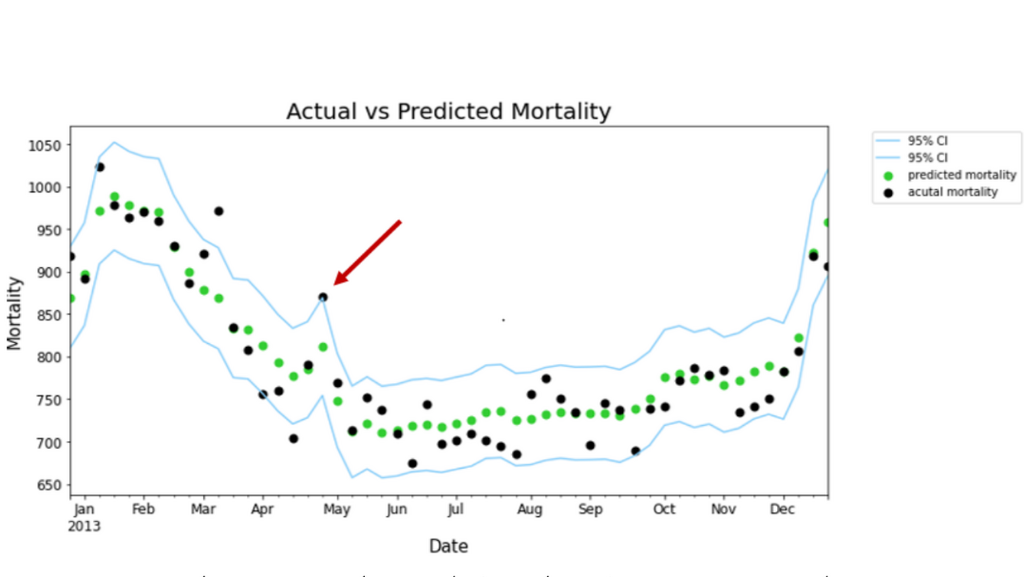Getting your Trinity Audio player ready...
The climate crisis in Israel, which causes extreme weather phenomena, has led to excess mortality in recent years, said a new study published Tuesday.
The Environmental Protection Ministry study examined extreme weather events between 2012 to 2020, which showed at least 45 Israelis died on average in each of the heatwaves that hit the country during those years. The study found the impact of the climate crisis was felt more severely among those aged 70 and older.
The study was conducted by Dr. Dan Yamin and Dr. Erez Shmueli from Tel Aviv University and commissioned by Prof. Noga Kronfeld-Schor, the chief scientist of the Environmental Protection Ministry.
In the framework of the study, a preliminary analysis was performed to examine the presence of excess deaths in Israel during heatwaves, which have become a frequent event in the Jewish State in recent years.
The ministry explained the analysis was done by: examining an excess mortality rate according to an existing model, which characterized the daily mortality pattern in Israel and based on daily data on temperature, humidity, and acute respiratory infection; and by comparing the weeks with heatwaves to the adjacent weeks (regardless of model forecasts).
The ministry also said the study found that after analyzing the date using both methods, it appears Israel has had a sharp and distinct rise in mortality in the weeks in which there were heatwaves.
3 View gallery


An example (marked in a red arrow) of predicted mortality (811) and actual mortality (873) during a heatwave that began in April 2013 in Israel
Summing up the eight heatwave cases examined in the study, excess mortality of 363 people was recorded. For example, after the heatwave on April 26, 2013, 871 people died, while the model projections predicted weekly mortality of 811 people (excess mortality of 60 people). Most of the abnormality was observed in adults over the age of 70, which accounted for 88.5% of the total death rate due to the heatwave.
The Environmental Protection Ministry said this figure in itself is a deviation from the norm, and it constitutes 70–73% of the total deceased during that time period, indicating high sensitivity of this population to heatwaves.
In addition, heatwaves between July 13-19, 2012, September 1-6, 2015, June 5-11, 2016, May 1-4, 2018, July 23-26, 2018, May 14-22, 2020, and September 4-8, 2020 were also examined in the study.
These heatwaves were defined by the meteorological service as "prolonged events where the heat load is heavier than normal and lasts for many hours during the day. In the mountains and inland, the heatwaves are characterized by high temperatures and low humidity. In the lowlands and coastal plain, the heatwaves are created from a combination of high temperatures and relatively high humidity that may reach 70% or more on the coastal plain for most of the day."
But heatwaves don't just affect mortality. Studies around the world have found that the number of hospitalizations and health expenses are also rising significantly.
The causes of hospitalization include cardiovascular disease, cerebrovascular disease, acute respiratory distress syndrome, and kidney disease, which are more susceptible to fever, as well as psychiatric diseases and dehydration. In addition, some studies suggest that the effects of heatwaves on hospitalization and mortality are particularly high in adults, women, and populations of low socioeconomic status.
Environmental Protection Minister Tamar Zandberg said the climate crisis poses a real threat to people's health and life. "The study suggests the urgent need for proper preparations for the climate crisis that the ministry leads along with the government. However, other government bodies and local municipalities should also be prepared for heatwaves to reduce early mortality, suffering, and medical expenses."
Prof. Noga Kronfeld-Schor the chief scientist of the ministry added that compared to flooding or fires, in which the direct physical impact on the economy and human health is clear, the effect of heatwaves is more complex.
"It is important to understand the medical implications of heatwaves to prevent them and to be prepared for them as much as possible, especially among weaker populations. Most of the health effects are preventable through early assessments and alert systems that are economically efficient. As part of Israel's assessment program for climate change, the environmental protection ministry operates to prepare for the heatwaves and the expected increase in their intensity, prevalence, and duration."



